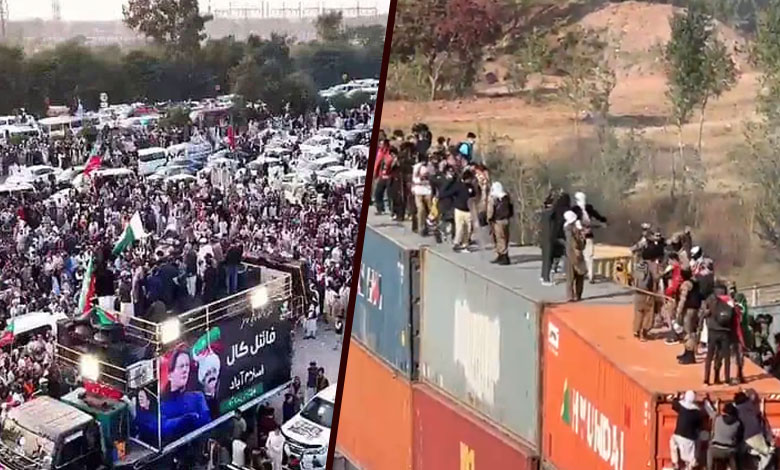Pakistan in Crisis: Govt Imposes Shoot-on-Sight Orders After Deadly Protests by Imran Khan’s Backers
Violent protests erupted in Pakistan on Tuesday, November 26, as supporters of former Prime Minister Imran Khan clashed with security forces, prompting the government to issue shoot-at-sight orders.

Islamabad: Violent protests erupted in Pakistan on Tuesday, November 26, as supporters of former Prime Minister Imran Khan clashed with security forces, prompting the government to issue shoot-at-sight orders. The unrest followed the death of four paramilitary Rangers and two policemen, with over 100 security personnel reportedly injured in the violence.
The clashes intensified when Khan’s Pakistan Tehreek-e-Insaf (PTI) supporters attempted to march towards Islamabad’s D-Chowk, removing barricades along their path. The government responded by deploying the army and vowing to prevent the protest from reaching its destination, even if it meant imposing a curfew.
Table of Contents
Casualties and Chaos
Radio Pakistan reported that four Rangers personnel were killed when a vehicle rammed into them on the Srinagar Highway in Islamabad late Monday night. Additionally, five Rangers and several police officials sustained severe injuries.
In Rawalpindi, about five kilometers away, miscreants armed with weapons attacked security forces, pelting stones and firing indiscriminately. Two policemen were reported dead, although further details were not provided.
Also Read: Muslims in India face unprecedented threats: Mehbooba Mufti
Punjab police confirmed one officer was killed during clashes near Hakla interchange on Islamabad’s outskirts but did not specify the circumstances surrounding the second death. Interior Minister Mohsin Naqvi revealed that over 100 security personnel, including a senior police officer, were injured in the violence, primarily due to stone-pelting.
Army Deployed, Shoot-at-Sight Orders Issued
The Pakistan Army was called in to manage the escalating situation, with explicit orders to deal strictly with “miscreants and troublemakers.” The government emphasized that anyone threatening public safety would be dealt with decisively.
Prime Minister Condemns Violence
Prime Minister Shehbaz Sharif strongly condemned the attacks on law enforcement personnel, labeling the protests as “anarchic” and motivated by a political agenda. He directed authorities to identify and prosecute those responsible while ensuring top-notch medical care for the injured.
PTI Accuses Government of Violence
The PTI alleged that the authorities used excessive force, injuring several of its supporters. A party spokesperson claimed that at least two PTI members were killed, but these reports remain unverified. The protests were initiated to demand the release of Imran Khan and other detained party members, the restoration of PTI’s alleged stolen electoral mandate, and the repeal of recent constitutional amendments increasing government control over the judiciary.
March to D-Chowk
Led by Khyber-Pakhtunkhwa Chief Minister Ali Amin Gandapur and Imran Khan’s wife, Bushra Bibi, PTI supporters began their march on Sunday from Khyber-Pakhtunkhwa. The protesters faced numerous roadblocks as authorities placed shipping containers on highways to slow their progress. Despite using heavy equipment to clear the hurdles, their plans were delayed.
Section 144 Imposed, Schools Closed
In response to the unrest, the government imposed Section 144, banning political gatherings. Educational institutions in Islamabad and Rawalpindi were also shut down as a precaution.
Imran Khan’s Detention and Political Turmoil
Imran Khan, currently imprisoned at Adiala Jail, has faced over 200 legal cases since his ousting through a no-confidence vote in 2022. His PTI party, despite contesting elections as independents, emerged as the largest party in February’s general elections. Khan alleges that the ruling coalition, led by the Pakistan Muslim League-Nawaz (PML-N) and Pakistan Peoples Party (PPP), manipulated the elections to seize power.
Uncertainty Looms
While the government has offered PTI an alternative protest site at Sangjani, talks are ongoing to resolve the crisis. Interior Minister Naqvi reiterated that the D-Chowk march would not be permitted under any circumstances, warning that stricter measures, including curfews, could be imposed.
As the situation remains tense, Pakistan braces for the aftermath of the violent clashes, with questions about political stability and public safety looming large.
